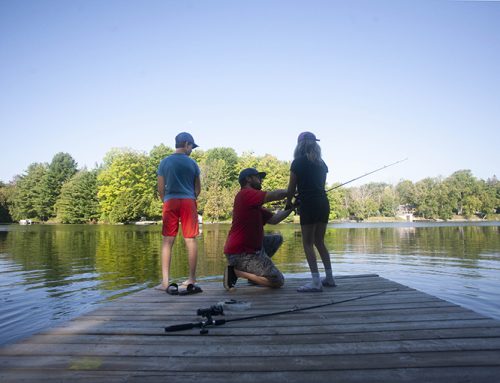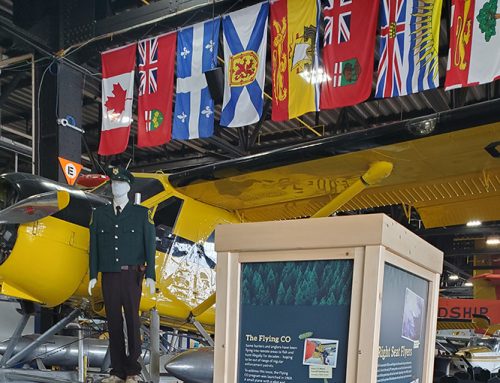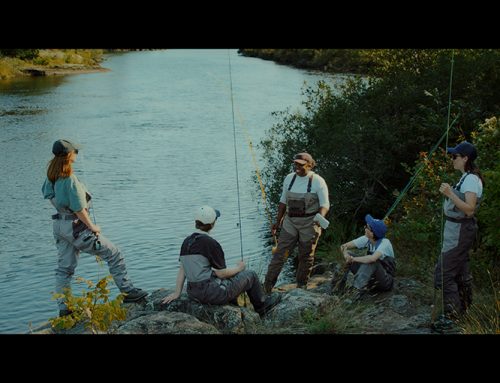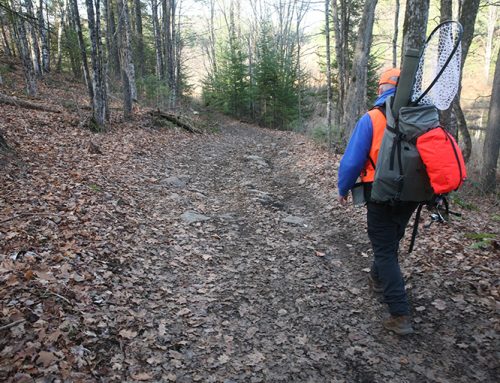
The Ministry of Natural Resources and Forestry (MNRF) is proposing to shorten the hunting season for moose calves this year and delay the start of the season in 2016.
The MNRF says recent moose population surveys have shown declining numbers of moose in some areas of northern Ontario. Before implementing more changes to the hunting season, however, it wants to hear from Ontario residents.
The proposals follow drastic cuts to moose tag allowances in certain Wildlife Management Units (WMUs) in 2014. In the Thunder Bay area, for example, there was an 87 per cent reduction in adult moose tags last year and in the Kirkland Lake area, the reduction was 93 per cent.
Project Moose
This year, in a project dubbed the Moose Project, the Ministry has developed an online survey calling on Ontario residents to provide input on the proposed changes. It says the changes were developed in response to pressures such as predators, parasites, hunting, climate and changing habitat.
As a result, the MNRF has proposed shortening the hunting season for moose calves to two weeks in northern Ontario starting in 2015, saying fewer young moose will be hunted so more calves should survive to become adult moose.
As well, the ministry proposes to delay the start of moose hunting season across much of northern Ontario by one week beginning in 2016 to allow more time for the rut to take place before gun hunting begins.
“This posting represents our response to the first phase of consultations as we work to address the declining moose population as evidenced from our moose aerial inventory,” Bill Mauro, minister of Natural Resources and Forestry said in a statement released last week. “The phase two consultations will be used to further define our response to bring forward additional options to be considered for implementation.”
OFAH offers response
In response to the proposals, the Ontario Federation of Anglers and Hunters says the province needs to stop focusing its management efforts solely on licensed moose hunters and start managing moose populations.
Although the OFAH acknowledges that some WMUs would benefit from a reduction in calf harvest, it says a two-week calf season is overly restrictive and could result in crowding and poor hunt quality, while making it difficult for hunters to accommodate fluctuations in weather, work schedules and hunting preferences.
“While we are encouraged by the ministry’s commitment to addressing Ontario’s declining moose populations and its reassurance that non-hunting factors affecting moose will be examined, we don’t agree with the specific changes being proposed,” said Mark Ryckman, OFAH senior wildlife biologist.
The federation suggests hunters go to the Environmental Registry website and search for EBR posting [#012-3413] Amendment to regulations under the Fish and Wildlife Conservation Act for moose hunting in northern Ontario and submit formal comments to express their opinions.
In a bid to encourage support through social media, the OFAH has also created the hashtag #ONMoose and is encouraging its supporters to use it to respond to the EBR.






Why not give everyone a bull tag but a bull must have at
least 2-3 brow tines on each side or minimum total of 8-10 points on
each horn thus only taking older mature bulls and forcing better and more
accurate kills and having draws for calves and cows if you get a cow tag
you can’t shoot a cow with a calf but you may shoot the calf and put
the cow tag on the calf. if you get a calf tag you can only shoot a calf or no calf tags at all and only certain areas have cow tags… same as the Alaska moose hunting
Limit the native harvest!!!
stop the native poaching.
Regulate the native hunt
I also believe the is in decline. This could have been caused by several factors. Climate change, tick infestation, brainworm, predation from bears and wolves, overharvest from hunting by the general population and hunting uncontrolled hunting by the aboriginal population. Cutting tags and shortening seasons will not help fast enough. The MNRF should take a more aggressive approach. They could:
1.) Open the spring black bear hunt across Ontario
2.) Put wolf hunting back onto the small game hunt.
3.) Stop all cow and calf hunting for 5 years
4.) Have a minimum age limit for hunting bulls
5.) Allow a FREE daw system. Then when you are drawn for a tag you pay a much larger license fee ($500.00)
6.) Control the aboriginal hunting system. Police their hunting by allowing them a certain number of tags.
7.) Only allow ATV’s and motorized vehicles into hunting areas to recover game.
If the MNRF does not take an aggressive enough stance there will not be moose available for our children to hunt. They have to disregard the hunters and the revenues they collect from the draw system and do what is right for the moose population.
there still will not be any more calves-there will only be more meat for bears and wolves.Get with the program and open your eyes.How can youse not understand that ?
I agree. Our MNRF should follow what BC did 15 or so years ago. Everyone gets a bull tag over the counter(residents) but with an antler restriction, spike, fork horn, or 3 points on the brow palm. NO COWS, NO CALVES, unless there is an over population problem. It worked so well for BC that across northern WMU’s there is now a rifle season from Aug. 15 through to the end of Oct, it doesn’t close for archery anymore for the rut because it is restrictive enough. There are lots of cows producing calves, which translates to a lot of spike and fork yearling bulls, then any bull that makes it through its first year is protected for a few years to breed until they become “trophy” bulls and can be harvested again. This also makes it much safer as hunters have to more accurately observe their targets before shooting, no such thing as the ‘if its brown its down’ mentality. It also provides opportunity for everyone to have a chance to hunt. Obviously this won’t work for all areas, but for most of the North it would. Also most of the WMU’s in my area, tags were not cut, however cow tags were doubled, check out 15a, 16a, 16b, 17, 18a, 18b. They all had huge cow tag increases to intentionally reduce the moose population and help caribou. Something is wrong with that when we are being told the moose are in trouble.
I am all for giving a bull tag to every Ont. resident hunter. Or model something like Quebec’s system, every other year calf and cow hunts. I have been penalized for to many years with hunting in an area around Algonquin Park. We have to even apply for calf tags in area 57 as the ministry cant tell how many moose our first nation takes from the areas. I don’t buy the crap that there is not enough moose around as we see them all the time and always see fresh sign when we don’t see actual animals. Frustrating to say the least
We as hunters must teach our children good hunting ethics. As leadership by good example can play a great part in the over harvesting. Young hunters of today will become the custodians of our lands tomorrow. As with all the comments, there are some really great points that can be taken away and used to control the Moose Hunting situation at hand. I just hope and pray that the MNRF will have a good hard look at these and take away some really good solutions based in these comments. As hunters we must speak up in order to protect our rights and more importantly our heritage
I have hunted from Huntsville to Terrace Bay, I have seen hunting groups of 2 members with 2 tags I have seen hunting groups of 15 members with 1. Lets really think about this.
1(If you put the number of members up per tag this will help the population grow (Who needs a moose to themselves).
2)If you control what the native take in certain areas the population will grow (And from what I hear this is a big issue)
3)If some areas populations are that bad I agree no calves or cow tag should be given out as well spike bulls should not be shot aswell.
As hunters most of us would do whatever it would take to protect are hunting and fishing lands. Maybe the Native and the Ontario Government should do the same, they seem to be the only ones that dont follow the rules and regs aswell as a few other idiots.
Maybe its also time the Ontario government steps up and pushes some more funding towards the MNR. We all know they are under staffed and could use some help protecting the wild life so many provinces and states would love to have.
Matt T
Trim the bear populations and maybe the calves would have a chance.